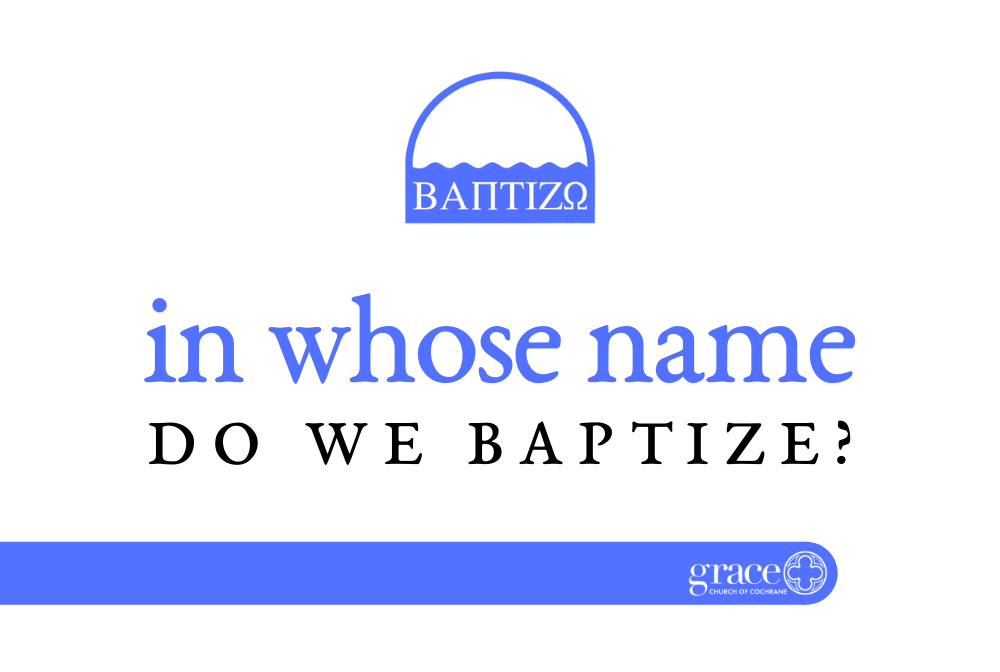In Whose Name Do We Baptize?

...baptizing them in the name of the Father and of the Son and of the Holy Spirit...(Matt. 28:19b)
One of the most distinctive things the Bible teaches about God is that God is Triune. This is a deeply mysterious doctrine that, frankly, is beyond the ability of limited, finite human beings like ourselves to fully grasp. This truth forces us to admit and confess that God is bigger than we are, that he is a God who we truly cannot contain or explain. And only such a God is truly able to save us from our predicament.
When Jesus told his followers to “make disciples...baptizing them,” he told them to baptize them “in the name of the Father and of the Son and of the Holy Spirit” (Matt. 18:19b). There’s a dizzying amount of truth packed into these few words. For one thing, the baptism is “in” the name of this Triune God—the Greek word rendered “in” here probably better means “into.” The Baptist theologian D.A. Carson observes that this “strongly suggests a ‘coming-into-relationship-with’ or a ‘coming-under- the-lordship-of’” the Triune God. Being baptized “into” the name of this God signifies a movement, from being separated from this God to being known by and belonging to him. A very rough, distant comparison might be how a bride takes her husband’s name when she is married; a Christian, when baptized, “is placed into” the name of the Triune God.
For another, baptism is in “the name” of the Father, Son, and Spirit. Jesus speaks very carefully here. Note that “the name” is singular. It’s not “the names” of the Father, Son, and Spirit. There’s only one name that we’re baptized into. This is so important to understand, because it points to the fact that there is only one God and that there is no other: “the Lord is God in heaven above and on the earth beneath; there is no other” (Deut. 4:39). By stressing baptism into the one Name of God, Jesus reminds his Jewish disciples how God revealed his Name to Israel:
The LORD descended in the cloud and stood with him there, and proclaimed the name ofthe LORD...“The LORD, the LORD, a God merciful and gracious, slow to anger, and abounding in steadfast love and faithfulness, keeping steadfast love for thousands, forgiving iniquity and transgression and sin, but who will by no means clear the guilty, visiting the iniquity of the fathers on the children and the children's children, to the third and the fourth generation. (Ex. 34:5-7)
This is the God whose name we “enter” when baptized. And it’s the paradoxical salvation promised in this very passage—being forgiven of “iniquity and transgression and sin” by a God “who will by no means clear the guilty”—that baptism is designed to put on display for all to see.
And finally, this one God is revealed to us in three Persons: “the Father...the Son, and...the Holy Spirit.” Somehow this one God exists in three Persons: a Father who is not the Son, and who is not the Spirit. This mystery is deep. Yet it hints that what we are baptized into is a life of eternal, inter-Trinitarian love—as Jesus the Son prayed to his Father: “you loved me before the foundation of the world....I made known to them your name, and I will continue to make it known, that the love with which you have loved me may be in them, and I in them” (John 17:24, 26). Baptism is not pledging allegiance to some abstract, undefined, generic “higher power.” It’s about believing in the One True God, who in the Old Testament revealed himself in fire and cloud to his people Israel, and who in the New Testament revealed himself as the Father who sent his Son, as the Son who died for our sins, and as the Spirit who now lives with us. It’s about belonging to the God who now loves us with the very love enjoyed from all eternity between the Father, Son, and Spirit.
More in Blog
August 15, 2022
Registration is LIVE for our "Zoomerang" VBS August 15-19!June 14, 2022
Means of Grace for June 14: God's Nature, Spurgeon's Evangelist, Culture War, Tradition & More!March 16, 2022
Preparing for One's Baptism Service